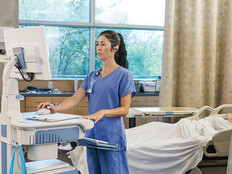Mobile Devices Boost Patient and Clinician Satisfaction
Traditional communication devices, such as pagers, have finally begun to give way to more modern tools in healthcare organizations. Smartphones, tablets and other mobile devices are making headway in modern treatment centers and effectively streamlining clinician communication while simultaneously improving patient satisfaction.
At Kansas-based Truman Medical Centers, for example, the organization increased patient and nurse satisfaction alike by adopting Zebra Technologies TC51-HC mobile computers. By pairing the computers with a system that can connect clinicians, patients and family members, the provider has been able to more effectively communicate across the care spectrum.
"Our nurses can take high-quality pictures of wounds or other medical issues and securely text those images to a member of the care team using the TC51-HC and Cerner’s Camera Capture application," Amy Peters, a registered nurse at Truman Medical Centers tells Healthcare IT News. "What is great about this is that it saves nurses time and creates a perpetual, real-life record automatically saved in a patient’s chart."
But mobile deployments can also provide better care for patients.
At Phoenix Children’s Hospital in Arizona, for example, the organization has buoyed patient satisfaction immensely by placing an Apple iPad in every room and encouraging patients to make use of it. In addition to health records and treatment plans, patients have access to entertainment options, including games and social media.
“Research shows that the quality of stay for patients and their potential medical recovery can be greatly influenced by whether they have a distraction device like this,” Executive Vice President and COO David Higginson tells HealthTech. “We have patients with cystic fibrosis who have to be in isolation over the winter months. Imagine being a teenager locked in a room with no access to social media for a month. It’s miserable.”
IP Phones Personalize Virtual Communication for Virtua Health
Meanwhile, new IP phones at Virtua Health in New Jersey are integrated with the organization’s electronic health record and customer relationship management systems, allowing hospital staff to provide more personalized responses when patients call to schedule an appointment.
“When the phone rings at our call center, a screen pops up showing who’s calling, so the staff can view their records, identify them by name and have a really good conversation,” Senior Vice President and CIO Thomas Gordon says.
Because physicians and nurses carry their IP phones at all times, they can access patients’ EHRs wherever they are. And because medical monitoring devices constantly feed data to the patient’s records, that can offer doctors advance warning of life-threatening events.
Using analytics, the system hypothetically can identify a patient who’s about to suffer a crisis and send an alert to the physician’s phone, so he or she can intervene before the event happens.
“We’re in the process of piloting something like that right now,” Gordon says. “It’s basically an early warning system, where the nurse or doctor would get a critical alert based on artificial intelligence.”










